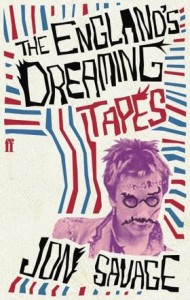by Richard King
As an undergraduate at Bristol University I shut firm a hardback I’d just bought, read and devoured in a two day sitting. I say read, it was as if someone had Xeroxed the pages into my head. Walking along Woodland Rd I wondered if the other students had noticed it as well: the sky had turned red and the trees were exploding. During three years of study, Jon Savage’s England’s Dreaming had more of an impact on me, and more to impart, than any book I read whilst studying English. From Beowulf to Sweet Virginia Woolf.
Greil Marcus recognised that in Lester Bangs he saw “the best writer in America (who) could write almost nothing but record reviews.” England’s Dreaming, as well as being one of the scant handful of truly great books about music, is among the most fascinating and illuminating social histories written about the UK and the kind of people who live here.
The England’s Dreaming Tapes, a collection of some of the interviews Savage conducted for the book twenty years ago, shows just how far Punk changed lives, and how intense the changes were. What’s fascinating is we now get to see how the protagonists felt about Punk ten to fifteen years after the fact – on the whole elated, reflective and a little spooked. This reads like a series of snapshots of the threads and ideas still playing out in their heads in pre-acid late eighties Britain. We get photographer Dennis Morris making a convincing case for the artwork on the first PiL album inaugurating style culture, or as he puts it: “that whole concept spawned everything like Spandau Ballet that came after.” We get a pretty mad rant from McLaren early on about MI5, Englishness and, you guessed it, the Establishment.
Equally the range of pop-as-social-culture here is breathtaking. From Leee Black Childers scoring a young Richard Lloyd as a Mott the Hoople groupie, to former Virgin PR Al Clark gleefully admitting Punk seriously freaked the music industry to Legs McNeil on the CIA. Its hard not to mist over when you hear Roger Armstrong list the vinyl stock at the Rock On stalls in Soho and Goldborne Road.
In England’s Dreaming Savage concentrated on, if not celebrated, the short year and a half when Punk’s utopian heresies were played out by intellectuals and avant yobs alike; Jah Wobble, Tony Wilson, Rotten, Richard Boon and Jordan all sharing a newly revealed mental space. Unsurprisingly the journalists and fanzine writers who felt the changes in real time: Caroline Coon at Melody Maker, Jonh Ingham at Sounds, NME’s Neil Spencer and Mark Perry all come out of the interviews as sharp, open-minded operators, punching well above their prescribed role as weekly commentators. In a cultural landscape where nobody needed the license of a job description to act, it was clearly a lot easier to make things happen.
As for the UK thirty years later? For Blair Peach read Ian Tomlinson. It’s fatally easy to be cynical. Better instead to spend time with this book and start dreaming again. And if you can read Joe Strummer reminiscing about mowing the grass on the Malpas Estate in Newport without a lump in your throat, well you’re a bigger man than me.
Richard is the creator and editor of Loops, a twice yearly magazine collaboration between Domino records and Faber. We’ll be covering if properly next week – it’s fantastic.
